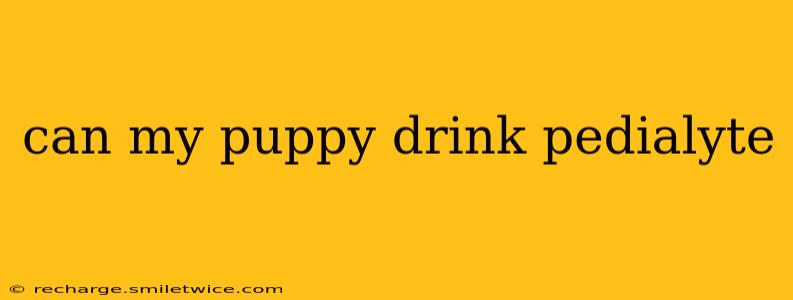Can My Puppy Drink Pedialyte? A Vet-Recommended Guide
Giving your puppy the best care is paramount, and sometimes, little ones get sick. When your furry friend isn't feeling their best, you might wonder about using Pedialyte, a common electrolyte solution for humans. While it might seem like a helpful solution, the answer to whether your puppy can drink Pedialyte is nuanced and requires careful consideration. Let's explore this topic in detail.
Is Pedialyte Safe for Puppies?
The short answer is: generally, no, not without veterinary guidance. Pedialyte, while designed to replenish electrolytes in humans, contains ingredients and concentrations that may not be suitable for puppies. Their smaller bodies and different metabolic systems can react differently to these ingredients. Giving your puppy Pedialyte without consulting your vet could potentially harm them.
What are the Risks of Giving My Puppy Pedialyte?
While seemingly innocuous, several risks are associated with giving Pedialyte to your puppy:
- Electrolyte Imbalance: Pedialyte's electrolyte composition is designed for humans. Giving your puppy an inappropriate amount could disrupt their delicate electrolyte balance, leading to further health complications.
- Kidney Issues: Puppies' kidneys are still developing, and excessive fluid or certain electrolytes could strain them.
- Sugar Content: Some Pedialyte formulas contain higher sugar content than is ideal for dogs, potentially leading to digestive upset or contributing to obesity.
- Artificial Sweeteners: Some versions contain artificial sweeteners which can be toxic to dogs.
What Should I Do if My Puppy is Dehydrated?
Dehydration is a serious condition in puppies and needs prompt attention. Never attempt to self-treat your puppy's dehydration. Instead, contact your veterinarian immediately. They can accurately diagnose the underlying cause of dehydration and recommend the appropriate treatment, which may include:
- Subcutaneous fluids: This involves administering fluids under the skin, a common method for rehydrating dehydrated animals.
- Intravenous fluids: In severe cases, intravenous fluids may be necessary to rapidly replenish fluids and electrolytes.
- Specific electrolyte solutions: Your vet can provide a formulation tailored to your puppy's needs.
What if My Puppy Has Diarrhea or Vomiting?
Diarrhea and vomiting are common causes of dehydration in puppies. Again, do not attempt to treat these conditions at home with Pedialyte. These symptoms can indicate various underlying health issues, requiring veterinary diagnosis and treatment. Contact your veterinarian immediately if your puppy is experiencing persistent diarrhea or vomiting.
Can I Give My Puppy Something Else Besides Pedialyte?
No, do not attempt to treat your puppy with any over-the-counter human medications or electrolyte solutions without explicit veterinary guidance. Your vet can determine the best course of action based on your puppy's specific needs and health status.
How Can I Prevent Dehydration in My Puppy?
Prevention is always better than cure. Ensure your puppy has access to fresh, clean water at all times. Monitor their water intake, especially during hot weather or after exercise. A balanced diet will also contribute to their overall health and hydration.
When Should I Call the Vet?
Contact your veterinarian immediately if you notice any signs of dehydration in your puppy, such as:
- Lethargy
- Sunken eyes
- Dry gums
- Loss of skin elasticity
In conclusion, while Pedialyte might seem like a readily available solution, it's crucial to remember that it's not a substitute for professional veterinary care. Always consult your veterinarian before administering any human medications or supplements to your puppy. Their health and well-being are paramount, and prompt veterinary attention is the best way to ensure their recovery from dehydration or other illnesses.
